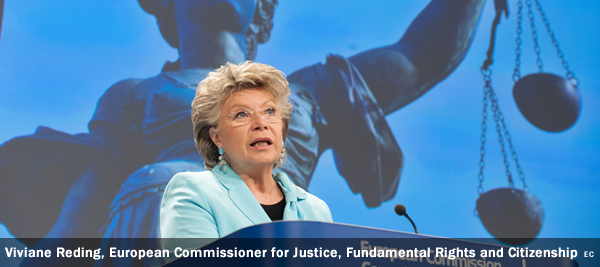European Union Justice Ministers have reached agreement in record time on a European Commission proposal (IP/13/750) to complete the legal framework for Europe-wide patent protection. The proposal will update EU rules on the jurisdiction of courts and recognition of judgments and pave the way for a specialised European patent court – the Unified Patent Court – to become operational.
The court will have specialised jurisdiction in patent disputes, avoiding multiple litigation cases in up to 28 different national courts.
The Commission says this will cut costs and lead to swift decisions on the validity or infringement of patents, boosting innovation in Europe. It is part of a package of measures recently agreed to ensure unitary patent protection in the Single Market (IP/11/470).
“By making changes to the rules on recognition of judgements, we are paving the way for the new Unified Patent Court to begin its work. I am pleased to see that Ministers have therefore given their agreement to this important Commission proposal in record time,” said Vice-President Viviane Reding, the EU’s Justice Commissioner. “[This] progress will allow the Parliament and Council to adopt the new rules without delay. This is good news for Europe’s single market. Removing bureaucratic obstacles, extra costs and the legal uncertainty of having 28 different and often contradictory systems makes the single market more attractive. This is a very good example of how justice policies can stimulate growth.”
Commissioner Michel Barnier, Internal Market Commissioner added: “Another decisive step has been made towards the Unitary Patent package becoming a reality, and the Unified Patent Court ensuring much greater consistency in the way patent litigation is conducted in the EU. This shows that the single market is progressing and serving innovation and ultimately for growth and jobs.”
As EU law stands now, in disputes concerning the validity or an alleged infringement of a patent, the proceedings concerning validity must be brought before the courts of the Member State in which the patent was registered. Those infringements proceedings may be brought before several courts, e.g., alternatively, the courts of the Member State of the defendant’s domicile or before the courts of the Member State where the patent infringement occurred or may occur. In many patent infringement proceedings the defendant makes the point that the patent is invalid. But this falls under the exclusive jurisdiction of the Member State where the patent is granted. In practice this mean that the patentee may have to litigate in parallel proceedings, involving considerable cost, complexity and potential divergent outcomes in court decisions.
The European Parliament now needs to agree on the proposal before it can become law. The Parliament’s Legal Affairs (JURI) Committee is expected to vote on its report in February 2014, with a final plenary vote expected the following month.
The Commission is also encouraging Member States to ratify the Unitary Patent Court Agreement as quickly as possible, and to complete the preparatory work required for the Court to become operational accordingly, so that the first unitary patents can be granted in the shortest possible timeframe.
The figures speak for themselves. In the United States, in 2011, 224 000 patents were granted, in China 172 000 while in Europe only 62 000 European patents were delivered. One reason for the difference is the prohibitive cost and complexity of obtaining patent protection throughout the EU’s single market. At present, someone seeking to obtain Europe-wide protection for their invention has to validate European patents in all 28 EU Member States. The patent holder may become involved in multiple litigation cases in different countries on the same dispute. But this will change in the near future thanks to the agreement on the unitary patent package.
The Unified Patent Court – established under an agreement signed on 19 February 2013 (PRES/13/61) – will simplify procedures and lead to quicker decisions, with just one court case before the specialised court instead of parallel litigation in national courts. The Court will be able to deliver judgments on the validity and the infringement of European and unified patents for all the Contracting States, avoiding parallel proceedings and divergent outcomes. 25 Member States are participating in this unified patent framework, which is open to all Member States.
The Agreement relies upon the “Brussels I Regulation” (Regulation 1215/2012) to determine international jurisdiction of the Unified Patent Court. The Commission therefore proposed an amendment to the Brussels I Regulation (IP/13/750) to clarify how its jurisdictional rules will work in the context of the Unified Patent Court, as well as how the rules of the Regulation should be applied in relations between the Member States, Parties to the Unified Patent Court Agreement and the Member States not party to the Agreement.
